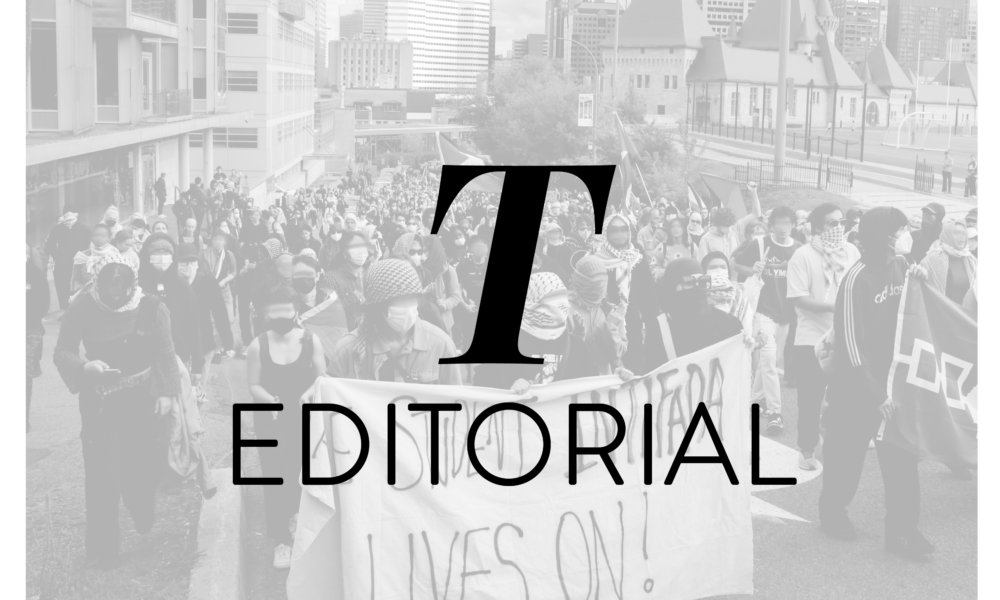In anticipation of heightened tensions on Oct. 7, the McGill administration preemptively closed campus, silencing student protest and increasing policing. The university moved classes online and required students to show identification at security checkpoints, with some students reporting that they were denied entry into academic buildings despite valid credentials. Fences restricted access to certain entrances, and vague emails from the administration fueled the confusion. While McGill claimed to be protecting its campus, its disproportionate response to student democracy by using armed officers and tear gas demonstrates a prioritization of property and image over addressing violence and genocide.
On the afternoon of Oct. 7, students in Montreal protesting the ongoing genocide in Palestine were met by over 80 officers from the Service de police de la Ville de Montréal (SPVM), more than a dozen officers from the Sûreté du Québec (SQ), and campus security. The event was organized by the Concordia and McGill chapters of Solidarity for Palestinian Honour and Resistance (SPHR), which demanded that both universities disclose and divest from partnerships tied to illegal Israeli settler colonialism. The demonstration took place in response to escalating Israeli terrorism, invasion, and occupation of Palestine and Lebanon in the past year.
Upon reaching McGill, protesters walked to 505 avenue des Pins Ouest, a McGill-owned building under construction, set to be the site of the Sylvan Adams Sports Science Institute—a “twin” institute to the one at Tel Aviv University. The project is named after Sylvan Adams, an Israeli billionaire and endorser of Israeli apartheid and violence. Some protestors took part in breaking windows with metal rods and bricks and tagging red triangles, a symbol associated with the Palestinian liberation movement. Riot police—some of them on bikes—stormed students, dispersing them using tear gas and pushing them off campus with physical violence.
On Oct. 8, McGill sent a message to staff and students informing them of a 10-day injunction preventing any members of SPHR and “all those who become aware of the judgment” from protesting within five meters of campus buildings. The ambiguity of McGill’s language and policies enables discriminatory enforcement, allowing authorities to selectively target certain groups while permitting others to demonstrate without the same restrictions. This frames some protesters as acceptable while portraying others, many being students of colour, as threats. McGill’s actions set a troubling precedent, suggesting that dissent is only tolerable within narrowly defined boundaries, stifling the very essence of meaningful protest.
The students’ act of breaking windows was not senseless destruction. When institutions remain indifferent to peaceful and democratic demands for justice, protest must disrupt the very symbols of power and complicity in order to make change. This infrastructure is not neutral; it embodies McGill’s investment in systems of violence and colonialism.
Language itself also poses a threat to progress, as McGill’s administration is unable to acknowledge Israel’s actions as genocidal. Recently, an anonymous legal notice forced the Post-Graduate Students’ Society (PGSS) to reframe their solidarity motion with Palestine as a “Commitment to Peace” motion, reflecting a trend of students having to refrain from explicit condemnation of genocide. While the McGill administration has supported Israeli students over the past year through student-wide emails, its support for those affected by the violence in Lebanon has been through private emails sent only to registered international Lebanese students, disregarding those with familial ties or dual citizenship who are also affected. By choosing when to offer public support, McGill demonstrates clear value signalling, and by choosing when to publicly engage, McGill aligns its messaging with political convenience rather than genuine care.
While much of McGill’s rhetoric encourages “peaceful protest,” it also demands that protests don’t disrupt or challenge the institution. However, protest that aligns with convenience will never change the status quo. Student activism is a critical artery for real change, and thus, it must pressure institutions to abandon the status quo on which a given issue is founded. McGill celebrates past movements only after they are safely in the rearview mirror, but condemns today’s activism as it challenges authority. The absence of protests should be far more alarming than their presence; silence in the face of genocide is more dangerous than disruption. The demands from students are clear—McGill must meet them. Anything less than divestment perpetuates the very injustices these protests seek to end.









